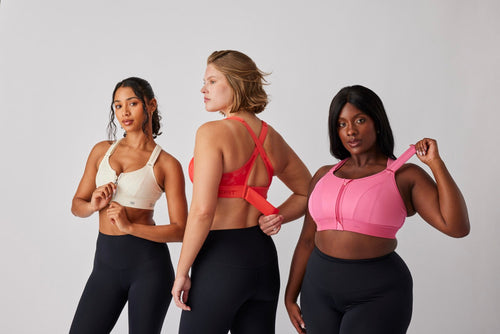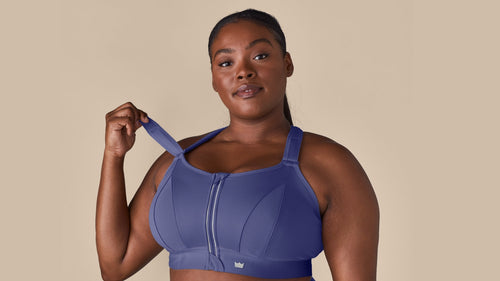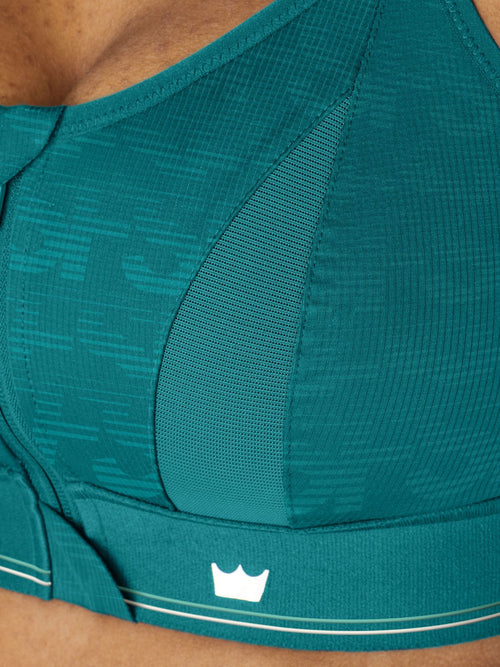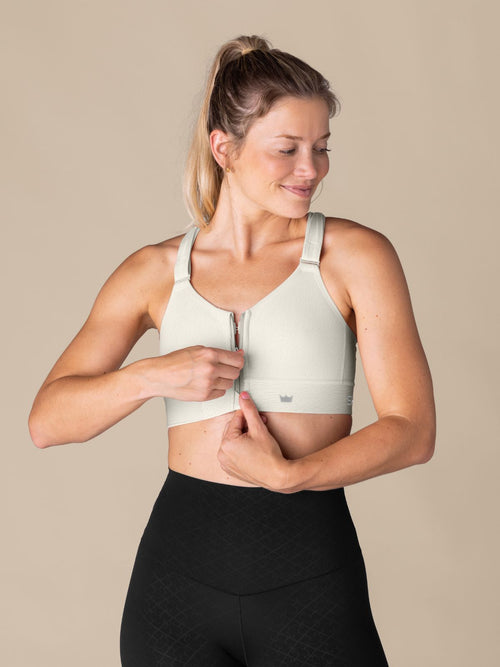NEW Emerge Sports Bra Shop Now
What Causes Belly Bloat? How Do You Get Rid of It?
Even if your nutrition is completely dialed-in and you’re putting every last ounce of effort into your workouts, a bloated belly can make you feel like you’re not making progress. Bloating comes and goes which can make it incredibly frustrating to pinpoint the root cause and find a solution.
Belly bloating is commonly caused by an imbalance of bacteria in the gut, a diet high in salt and processed foods, dehydration, and overconsumption of certain ingredients. Bloating can also stem from medical conditions like Irritable Bowel Syndrome (IBS), food sensitivities, and allergies.
As you can tell, belly bloating can come from several different causes so it's always best to get your doctor's thoughts on the matter, and uncover the cause. For more benign scenarios, this could include making simple changes to your diet. There are even some quick fixes that might help, let's review them now.
How to Get Rid of Bloating in 5 Minutes
While the majority of belly-bloating cases are not life-threatening, it's always best to speak with your doctor about it. Some cases can be treated with simple lifestyle changes.
Regardless of how you decide to handle your belly bloating, it's a good idea to start taking note of when your belly tends to be bloated, and whether or not there are consistent things you’re doing that could cause it.
Now then, there is one quick fix for certain causes of bloating, and that's to get more active.
Decrease Belly Bloating by Walking after Meals
An extensive study set out to see what effects, if any, taking a short walk after meals would have on bloating. For the study, the researchers had one group of participants try a medication used to treat digestive problems. The other group simply walked for 10-15 minutes after their meal.
Surprisingly, the researchers found that walking was as effective at treating belly bloating as the medication they used. Plus, people who went for a walk after their meals reported feeling less full afterward.
Even if it’s only for 5 minutes, try to get up and walk after meals.
How Do I Lose Belly Bloat Once and for All?
Quick fixes might reduce your bloating, but it could take longer to figure out the root cause and develop a strategy to solve it. You might need to experiment with eliminating different foods from your diet or try different treatments that a doctor recommends.
If you're on the hunt for some different ways to get rid of belly bloating, we've created a list of 12 things you can try to reduce belly bloating, and hopefully get rid of that stomach pain.
While they may not work for you, or they may not happen overnight, you may want to give them a read, since you'll find that they often involve practical and simple ideas that create a more positive and healthy lifestyle.
You’re Not Alone
Almost 90,000 people were surveyed for a study to better understand bloating symptoms. Around 14% of the people who were surveyed had experienced bloating in the past week, which shows how common it is! Plus, women were more likely than men to report symptoms.
The study found that some conditions were correlated with bloating, including irritable bowel syndrome and ulcerative colitis. Other symptoms that tended to go along with bloating included pain in the abdomen and excessive gas.
One of the most surprising findings from this survey is that only about 40% of people who reported bloating had ever sought help. If you’re having trouble solving this pesky problem on your own, talk to your doctor to get advice. They can give you a proper diagnosis and treatment plan if you have an underlying medical problem.
2 Lifestyle Changes That May Reduce Bloating
In general, there are lifestyle changes you can take on that could impact the severity of bloating, such as paying closer attention to what you eat and drink, as well as promoting healthy gut bacteria.
1. Watch What You Eat and Drink
If medical reasons have been ruled out, your diet might be the culprit. Certain foods can cause bloating if your body has trouble processing them.
Lactose
Many adults are intolerant of certain carbohydrates, and half of Americans have trouble digesting lactose, which is the carbohydrate found in milk and other dairy products. In other countries, that number can be even higher.
Fiber Rich Foods
The Cleveland Clinic lists foods that commonly cause bloating, and the number one culprit to top the list is beans, which are rich in fiber and can be hard to digest.
Pro Tip: You can soak them in water before eating to make them softer and easier on your stomach. You can do the same with lentils, which are another legume that can cause bloating.
Wheat, rye, and barley are grains that contain a lot of fiber and can cause bloating. They can also cause issues in people who have Celiac disease because they contain gluten. You can replace them with another grain, oats, which shouldn’t cause as many problems.
Carbonated Drinks
You probably know that carbonated beverages can cause bloating. The bubbles in soda and seltzer water can make you feel full, even if the drink itself doesn’t have many calories. But, did you know that diet drinks may be even worse for that bloated feeling?
Diet drinks in particular can be hard to digest because they contain artificial sweeteners. Your body might not react well to sweeteners, which is important to note since they’re in more foods than just sweetened beverages. You can replace diet drinks with water to cut down on both carbonation and artificial sweeteners.
Alcohol and Bloating
Alcohol is another potential dietary cause of bloating, and for women, in particular, there's evidence suggesting that bloating can have a more profound effect because of the way they process alcohol.
According to the authors behind this suggestion, women are more affected by alcohol than men. Plus, younger women have been drinking more and more in recent years, which could cause damage to the digestive tract and contribute to an increase in irritable bowel syndrome and bloating.
There’s no easy substitution you can make to swap alcohol out of your diet, but you can cut down on drinking or eliminate it to see if your bloating decreases.
2. Balance Your Gut Bacteria
Another potential problem that causes bloating is a disruption in the gut microbiome. There are many different forms of bacteria in your intestines that help you digest food and play other important roles in the body.
A study investigated the use of prebiotics and probiotics in patients with irritable bowel syndrome. Prebiotics are carbohydrates that promote the growth of healthy gut bacteria while fighting off harmful bacteria. The researchers noted that prebiotics helped reduce bloating in people with irritable bowel syndrome.
Probiotics are microorganisms that can alter the bacteria in your gut. They can be found in foods or supplements. The same study found that probiotics also reduce bloating and other symptoms of irritable bowel syndrome (IBS).
In just about any other setting to add prebiotics and probiotics, we'd glamorize the life of kombucha, but because of the carbonation and the ill effects it can have on bloating, you'll want to get prebiotics and probiotics differently. Kombucha could just make it worse.
What To Do About The Bloat
A bloated belly can be frustrating, particularly if you don’t know what’s causing it. You can try different cures but they might not alleviate the underlying problem. If you're looking for some ideas, definitely check out SHEFIT's list of 12 ways to get rid of belly bloating.
If you’re fed up and need help, try seeing a doctor. They might be able to help you or refer you to a dietician who can recommend the right foods for you. Cutting out certain types of carbohydrates from your diet may help.
Supplements, such as prebiotics or probiotics, can also reduce bloating. Walking after meals can help you feel less full and decrease any discomfort you might have.
Remember that bloating is quite common, so you’re not alone in your struggle.

























